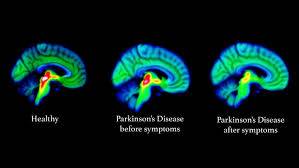
What is Parkinson’s disease (PD)?
PD is a neurodegenerative disorder that progresses as the dopamine-producing (“dopaminergic”) neurons in the brain become impaired. These neurons in the ‘substantia nigra’ region mainly control movement and their loss coupled with decreased dopamine results in tremors (trembling in the hands, arms, legs, and jaw); rigidity (stiffness of the limbs); slowness of movement; and poor balance and coordination.
These hallmark symptoms of PD appear in patients with 80 percent or greater loss of dopaminergic neurons in the substantia nigra. Lewy bodies (accumulation of abnormal alpha-synuclein) are found in substantia nigra neurons of people with PD.
Why is it important to talk about PD?
Just as it is not common knowledge that eminent people including Muhammad Ali, Johnny Cash, singer, Michael J. Fox, and others have battled with Parkinson’s disease, there is even lesser awareness of the disease and endemic PD support groups that can be reached out to.
The prevalence of PD has doubled globally in the past 25 years. In 2019, there were around 8.5 million individuals with PD and the number is increasing. There is no cure for Parkinson's disease PD, but therapies including medicines that increase the amount of dopamine in the brain, surgery, and rehabilitation can reduce PD symptoms.
What are PD support groups, and societies all over the world?
Dedicated organisations, and platforms internationally catering to Parkinson’s patients and their caregivers regarding resources and support include the National Parkinson’s Foundation, American Parkinson’s Disease Association, Michael J. Fox Foundation, Parkinson’s Disease Foundation, European Parkinson’s Disease Association, The Davis Phinney Foundation, The Parkinson Alliance, Partners in Parkinson’s, Caring.com, and The National Parkinson Foundation.
Parkinson’s Europe has enlisted active Parkinson’s organisations worldwide on their web page. Among 51 leading nations, South Asia is represented by Pakistan and India, surprisingly there is no resource available from China. Pakistan is represented by the Pakistan Parkinson's Society (PPS) operating from DHA Karachi.
Recently Parkinson’s support group meeting jointly organised by PPS and AKUH was held on Thursday 25 January 2024, at the AKUH Main Building in the Physiotherapy Rehab Centre. Guest Speaker Dr. Dureshawar (Neurologist and DBS surgeon) delivered a talk on “Introduction to Clinical Features and Initial Management”. DBS stands for ‘Deep Brain stimulation’ (DBS).
DBS is a neurosurgical procedure that uses implanted electrodes and electrical stimulation to treat movement disorders associated with Parkinson's disease (PD), essential tremor, dystonia, and other neurological conditions.
PSS, a PD resource in Pakistan
Pakistan Parkinson’s Society (PPS) is a nonprofit society started in the 1980s by a gentleman Mr. Haroon Bashir (who himself had the condition). It is a free-flow organisation taking overboard caretakers, patients, and doctors. It started very well in the day when it was headed by Mr. Haroon Bashir, doctors and physicians got the roles within the society, and some eminent names playing roles in its development include: Mr. Irshad Jan one of the Directors, Dr. Nadir Ali Syed the Vice Chairman, Amir Pasha a very experienced Director.
However, since the death of Mr. Haroon Bashir (the founder) 6 years ago, PPS has not been able to shine like before. Ms. Maha Khan works as the social media manager and representative at PPS, appointed by the Vice Chairman Dr. Nadir Ali Syed; she was very generous in providing valuable insights on the paradigm of how PPS the only Parkinson’s support society from Pakistan is working, what it aims to achieve for the community and what hurdles are impeding the community awareness on PD.
Today in Pakistan it is one of the most highly increasing diseases in 2023, 2024, with little or no awareness and many misconceptions regarding symptoms and treatment options,” says Maha Khan.
“It is a brain disease and not just a disease of nerves. There’s no particular medication to cure this disease, it is an ongoing illness, and it cannot be curbed but can be managed with diet, exercise, and mental health. It is not certainly the disease of old age, onset can be in young people with fluctuating dopamine levels in the nervous system. Also, not every hand-shaking tremor indicates Parkinson’s, there are mild nerve tremors that must not be mistaken for Parkinson’s. The tremors and handshaking associated with Parkinson’s is a continued state compounded with sleep problems and loss of motor control of hands.”
What are the recent possible cures, and treatments for Parkinson’s Disease?
Scientists are focusing on the roles of the gut, genetics, and PD disease progression, in general, to be able to pinpoint effective interventions for the cure of PD. A recent study published in Neuron highlights the autoimmune effect CD4T cells may have on the enteric neurons, by attacking the alpha-synuclein, the protein that aggregates in the brains of people with Parkinson’s disease PD.
Another important study by Dr. Lang’s team highlights the SynNeurGe (pronounced “synergy”) model that focuses on biological factors that contribute to the disease: i) the presence of pathologic α-synuclein in the brain (S); ii) evidence of neurodegeneration, which occurs as the disease progresses (N); and iii) the presence of gene variants that cause or strongly predispose a person to the disease(G).

